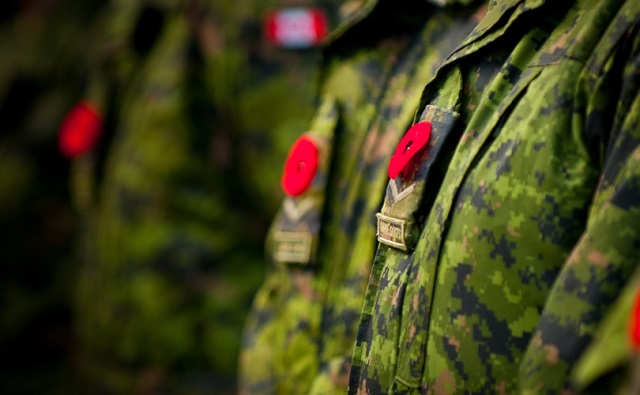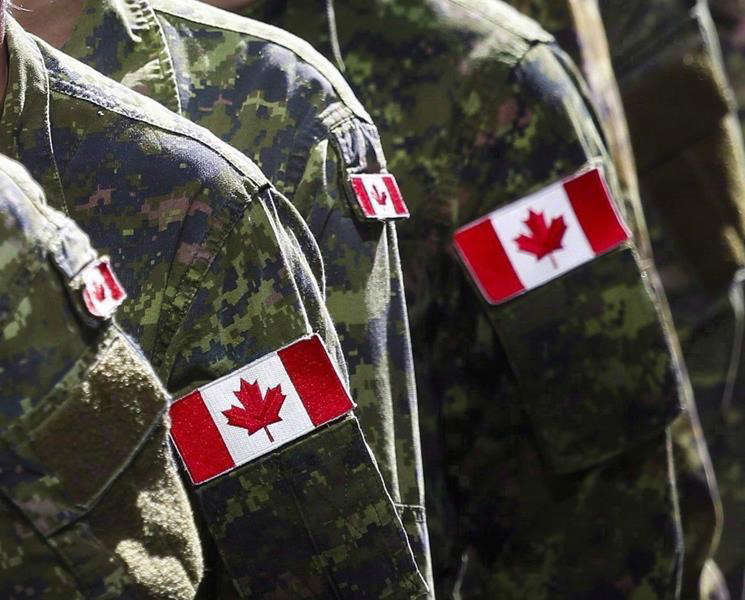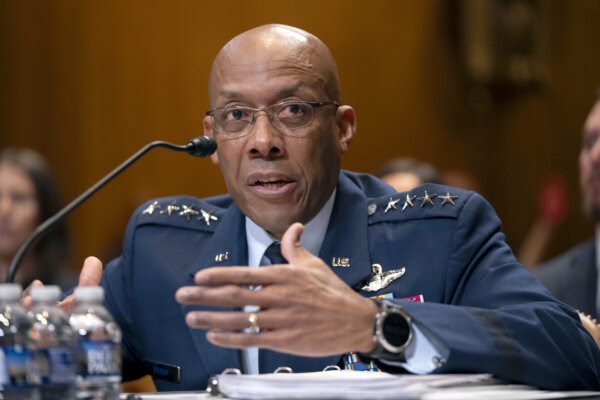armed forces
Canadian military members speak out after being told chaplains shouldn’t use ‘God’ in public prayers

From LifeSiteNews
‘Freedom of religion, I’m afraid, is slowly being replaced by freedom from religion,’ one CAF member told LifeSiteNews.
Members of the Canadian Armed Forces (CAF) gave their exclusive reactions to LifeSiteNews this week after being told they shouldn’t call upon God during public prayers in order to prioritize inclusivity and “diversity” just weeks before the national November 11 Remembrance Day holiday. The Minister of National Defence has stated that public prayer must “reflect the spiritual and religious diversity of Canadians.”
In exclusive phone interviews with LifeSiteNews, CAF members who are known to LifeSite but have asked to remain anonymous spoke out against what they see as an increased secularization of the military.
“In a nutshell, this change is: Abolish God from the public square,” one military member said, explaining that the “ethos undergirding the document” is one emphasizing the “spiritual” rather than the “religious.”
“Freedom of religion, I’m afraid, is slowly being replaced by freedom from religion,” another CAF member told LifeSite.
Their remarks pertain to an October 11 memo signed by Chaplain General Guy Belisle and obtained by The Epoch Times that directed Canadian chaplains to “adopt a sensitive and inclusive approach when publicly addressing military members.”
“While the dimension of prayer may occupy a significant place for some of our members, we do not all pray in the same way; for some, prayer does not play a role in their lives,” the memo reads.
Any “spiritual reflection” offered by military chaplains in a public setting (not including church services or private interactions with members) must be “inclusive in nature, and respectful of the religious and spiritual diversity of Canada,” according to the directive.
Spiritual leaders are also directed to “consider the potential that some items or symbols may cause discomfort or traumatic feelings when choosing the dress they wear during public occasions.”
Minister of National Defence Bill Blair responded to news concerning the directive by emphasizing that “Canadian Forces chaplains are not – and will not be – banned from prayer on Remembrance Day, nor at any other time,” The Post Millennial reported.
However, Department of National Defence spokesman said that chaplains giving reflections in public, mandatory military ceremonies “should not use the word ‘God’ or other references to a higher power such as ‘Heavenly Father’” in order “ to ensure that all feel included and able to participate in reflection no matter their beliefs.”
Active-duty CAF members who spoke with LifeSiteNews say the new directive effectively bans theistic prayer and sets up secularism as the only acceptable religion.
One military member told LifeSite that chaplains had been allowed to call upon a theistic God in an “inclusive” manner at public events like mess dinners and the celebration of Remembrance Day under prior guidance, but under the new directive “God can’t be invoked.”
He said military chaplains are further directed to be “mindful of the Gender Based Analysis (GBA+)” in their reflections, going on to explain that GBA+ is an “analysis framework that [officials are] using to basically re-examine their policies throughout the organization” for the purposes of advancing equity within the context of gender ideology.
Under the principles, the source told LifeSite, it could even be “problematic to say ‘God’ in the masculine, like in the ‘Our Father.’”
Another CAF member told LifeSite that the new memo has made military chaplains “so afraid of saying something wrong” that “even very liberal chaplains” are “too afraid” to write their “own reflection on Remembrance Day.”
He said the authentic variety of religious beliefs – in which Christians, Jews, Muslims, and others are able to express and share their faiths – is being exchanged for secular uniformity packaged as “diversity.”
The source told LifeSite that the recent chaplaincy directive amounts to “a purging of all traditional values” and a message that “the only acceptable religion now will be secularism.”
“If we can’t even live according to our conscience, if you can’t speak truth as we see it, then we’ve lost the essence of what it means to be the military,” he said. “We’ve lost our freedom.”
The first CAF member to speak with LifeSite explained that the new directive rests on the Canadian Supreme Court’s 2015 decision Mouvement laïque québécois v. Saguenay (City), which declared that “The state must instead remain neutral” in matters “religion and beliefs.”
However, he argued that neutrality shouldn’t mean banning specific religious expressions and noted that soldiers going into battle face an entirely different set of risks than ordinary government employees, up to and including serious injury and death.
“Given the realities of soldiering and everything that comes with that, I would ask, has that not changed the equation? Does that not change things?” he said. He argued that soldiers having “spiritual tools at their disposal,” including prayers and blessings, makes the CAF “more resilient, more capable, more spiritually healthy.”
“By taking that away from people, do you have the soldier’s best interests in mind? Do you have spiritual fitness in mind? Are you playing politics? That’s my question,” he said.
armed forces
Canada’s Military is Collapsing. Without Urgent Action, We Won’t Be Able To Defend Ourselves

From the Frontier Centre for Public Policy
By David Leis
Decades of underfunding and political neglect have left our military weak and unprepared
What Lt.-Gen (retired) Michel Maisonneuve (ret.) told me about Canada’s military was nothing short of alarming. He didn’t mince words—our armed forces are in dire straits. If we don’t act now, Canada will not only be unable to defend itself, but it will cease to be taken seriously by our allies, many of whom are already losing patience with our military decline.
Maisonneuve has seen firsthand what a functioning military looks like. He has served at the highest levels, working alongside our allies in NATO, and he knows exactly what Canada is failing to do. “We are no longer at the table when major defence decisions are made,” he told me. “The Americans don’t ask us what we think anymore because they know we can’t contribute.” That is a stunning indictment of where we now stand—a country that was once respected for its ability to punch above its weight militarily has been reduced to an afterthought.
The problem, as Maisonneuve laid out, is both simple and staggering: Canada doesn’t take its defence seriously anymore. The government has allowed our forces to wither. The Air Force is still buying CF-18s from the 1980s because the long-delayed F-35 procurement is years behind schedule. The Navy, once a competent maritime force, is barely functional, with no operational submarines and a fleet that is nowhere near what is needed to patrol our vast coastlines.
Meanwhile, the Army is struggling to recruit and retain soldiers, leaving its numbers dangerously low. “We have an Army in name only,” Maisonneuve said. “If we were called upon tomorrow to deploy a fully operational combat force, we couldn’t do it.”
Even more shocking is the state of readiness of our troops. A recent report found that 75 per cent of Canadian military personnel are overweight. Maisonneuve didn’t sugarcoat it:
“It’s unacceptable. We are supposed to be training warriors, not watching fitness standards collapse.” When the people entrusted with defending our country are struggling with basic physical fitness, it speaks to something much deeper—an institutional rot that has infected the entire system. Our allies have noticed. Canada was locked out of AUKUS, the military alliance between the U.S., the U.K. and Australia. “It wasn’t an oversight,” Maisonneuve explained. “It was a deliberate snub. The Americans don’t see us as a serious defence partner anymore.” That snub should have been a wake-up call. Instead, our government shrugged it off.
Meanwhile, Washington is openly questioning Canada’s value in NATO. The Americans see the numbers—Canada refuses to meet even the minimum defence spending requirement of two per cent of GDP. Instead of fulfilling our obligations, we offer up empty promises and expect others to pick up the slack.
Maisonneuve is blunt about what needs to be done. “First, we need to fully fund the military—and that means not just hitting the NATO target but exceeding it. Our allies spend real money on their defence because they understand that security is not optional.” He suggests Canada should aim for at least 2.5 per cent of GDP, not just as a show of commitment but as a necessity to rebuild our capabilities. Beyond money, Maisonneuve argues that military culture must be restored.
“We’ve allowed ideology to creep into the ranks. The military’s primary function is to defend the nation, not to serve as a social experiment,” he said. “We need to get back to training warriors, not worrying about whether we’re ticking the right diversity boxes.” He believes a return to a warrior ethos is essential— without it, the military will remain directionless.
Procurement is another disaster that Maisonneuve insists must be fixed immediately. “We’ve spent years dithering on replacing equipment, and every delay puts us further behind,” he said. The F-35 deal should have been signed years ago, but political hesitation means we won’t see a full fleet for years. The Navy urgently needs new submarines and icebreakers, especially to secure the Arctic, where other global powers, particularly Russia, are ramping up their presence.
The biggest issue, though, is manpower. “We need to rebuild the forces, period,” Maisonneuve told me. “That means recruiting, training, and retaining soldiers, and we are failing at all three.” He even suggested that Canada should consider implementing a national service requirement, a move that would not only increase troop numbers but also instill a sense of duty and responsibility in younger generations. “We used to be a country that took security seriously,” he said. “What happened?”
That’s the question, isn’t it? What happened to Canada? How did we go from being a country that contributed meaningfully to global security to one that can’t even defend itself? The reality is that successive governments have let this happen—first by neglecting funding, then by letting bureaucracy suffocate procurement, and finally by allowing the core purpose of the military to be diluted.
Maisonneuve is clear: Canada must act now, or it will cease to be taken seriously.
David Leis is President and CEO of the Frontier Centre for Public Policy and host of the Leaders on the Frontier podcast
armed forces
Trump fires chairman of Joint Chiefs of Staff, appoints new military leader


From the Daily Caller News Foundation
By Mariane Angela
President Donald Trump announced Friday the dismissal of General Charles Brown, the current Chairman of the Joint Chiefs of Staff.
In a post on Truth Social, Trump expressed his gratitude toward Brown for his extensive contributions and leadership, wishing him and his family a prosperous future. Brown’s departure marks a pivotal moment in U.S. military leadership following over 40 years of service.
“I want to thank General Charles “CQ” Brown for his over 40 years of service to our country, including as our current Chairman of the Joint Chiefs of Staff. He is a fine gentleman and an outstanding leader, and I wish a great future for him and his family,” Trump wrote.
Simultaneously, Trump introduced his nominee for Brown’s successor.
“Today, I am honored to announce that I am nominating Air Force Lieutenant General Dan “Razin” Caine to be the next Chairman of the Joint Chiefs of Staff. General Caine is an accomplished pilot, national security expert, successful entrepreneur, and a “warfighter” with significant interagency and special operations experience,” Trump said.
Trump said Caine’s appointment comes after he was overlooked for advancement during former President Joe Biden’s presidency.
“General Caine was passed over for promotion by Sleepy Joe Biden. But not anymore! Alongside Secretary Pete Hegseth, General Caine and our military will restore peace through strength, put America First, and rebuild our military,” Trump said. President Trump also announced plans to appoint five additional senior military officials, tasks he has delegated to Secretary Hegseth.
It was reported Thursday that Hegseth plans to dismiss Brown as part of President Trump’s commitment to eliminate “wokeness” from the military. Brown reportedly appears on a list of proposed removals submitted to Congress.
Brown had previously expressed his wish to retain his position even after Trump took office, and according to sources speaking to NBC News in Dec. 2024, Trump seemingly moderated his views on the general. Biden nominated Brown as chairman in 2023, and despite a heated confirmation hearing where senators scrutinized his alleged implementation of racial quotas in Air Force hiring practices, he was confirmed.
Meanwhile, Brown’s replacement, Caine, took office as the associate director for Military Affairs at the CIA on Nov. 3, 2021, after serving as the director of Special Programs at the Pentagon. Lt. Gen. Dan Caine, an F-16 pilot with extensive experience including over 150 combat hours, was commissioned in 1990 and has held numerous key roles, from the White House staff to special operations, and balances his military career with entrepreneurial ventures.
-

 2025 Federal Election2 days ago
2025 Federal Election2 days agoOttawa Confirms China interfering with 2025 federal election: Beijing Seeks to Block Joe Tay’s Election
-

 2025 Federal Election1 day ago
2025 Federal Election1 day agoBREAKING: THE FEDERAL BRIEF THAT SHOULD SINK CARNEY
-

 2025 Federal Election1 day ago
2025 Federal Election1 day agoHow Canada’s Mainstream Media Lost the Public Trust
-

 2025 Federal Election2 days ago
2025 Federal Election2 days agoReal Homes vs. Modular Shoeboxes: The Housing Battle Between Poilievre and Carney
-

 2025 Federal Election1 day ago
2025 Federal Election1 day agoCHINESE ELECTION THREAT WARNING: Conservative Candidate Joe Tay Paused Public Campaign
-

 John Stossel1 day ago
John Stossel1 day agoClimate Change Myths Part 2: Wildfires, Drought, Rising Sea Level, and Coral Reefs
-

 COVID-191 day ago
COVID-191 day agoNearly Half of “COVID-19 Deaths” Were Not Due to COVID-19 – Scientific Reports Journal
-

 Media23 hours ago
Media23 hours agoCBC retracts false claims about residential schools after accusing Rebel News of ‘misinformation’





